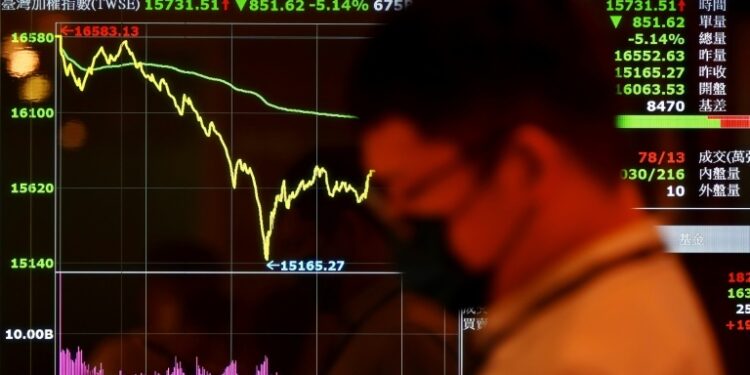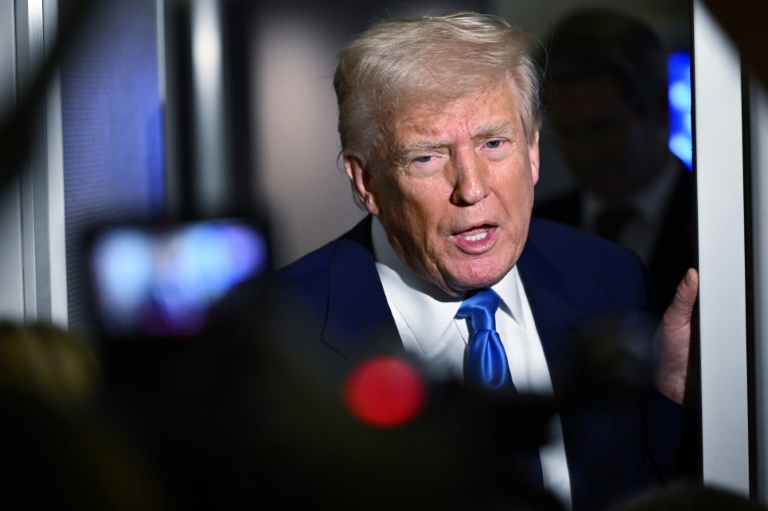Hong Kong (AFP) – Asian equities collapsed on a black Monday for markets after China hammered the United States with its own hefty tariffs, ramping up a trade war many fear could spark a recession. Trading floors were overcome by a wave of selling as investors fled to the hills, with Hong Kong’s loss of 12 percent marking its worst in more than 16 years, while Taipei tanked more than nine percent and Tokyo more than seven percent. Futures for Wall Street’s markets were also taking another drubbing, while concerns about the impact on demand saw commodities slump.
President Donald Trump sparked a market meltdown last week when he unveiled sweeping tariffs against US trading partners for what he said was years of being ripped off. He claimed that governments were lining up to cut deals with Washington. However, after Asian markets closed on Friday, China announced it would impose retaliatory levies of 34 percent on all US goods from April 10. Beijing also imposed export controls on seven rare earth elements, including gadolinium—commonly used in MRIs—and yttrium, utilized in consumer electronics.
On Sunday, vice commerce minister Ling Ji told representatives of US firms that its tariffs “firmly protect the legitimate rights and interests of enterprises, including American companies.” Hopes that the US president would rethink his policy in light of the turmoil were dashed when he stated he would not make a deal with other countries unless trade deficits were resolved. Trump denied that he was intentionally engineering a selloff and insisted he could not foresee market reactions. “Sometimes you have to take medicine to fix something,” he said of the ructions that have wiped trillions of dollars off company valuations.
The savage selling in Asia was widespread, with no sector left unharmed. Tech firms, car makers, banks, casinos, and energy firms all felt the pain as investors abandoned riskier assets. Among the biggest losers, Chinese ecommerce titans Alibaba tanked more than 17 percent, and rival JD.com shed 14 percent, while Japanese tech investment giant SoftBank dived more than 11 percent and Sony gave up nine percent. Hong Kong’s 12 percent loss marked its worst day since October 2008 during the global financial crisis. Shanghai shed more than seven percent, and Singapore eight percent, while Seoul gave up more than five percent, triggering a so-called sidecar mechanism—for the first time in eight months—that briefly halted some trading. Sydney, Wellington, Manila, and Mumbai were also deep in the red.
“We could see a recession happen very quickly in the US, and it could last through the year or so; it could be rather lengthy,” said Steve Cochrane, chief Asia-Pacific economist at Moody’s Analytics. “If there’s a recession in the US, of course, China will feel it as well because demand for its goods will be hit even harder—harder than they would have been hit just because of the tariffs,” he added. Concerns about demand saw oil prices sink more than three percent at one point on Monday, having dropped around seven percent on Friday. Both main contracts are now sitting at their lowest levels since 2021. Copper—a vital component for energy storage, electric vehicles, solar panels, and wind turbines—also extended losses.
The losses followed another day of carnage on Wall Street on Friday, where all three main indexes fell almost six percent. This came after Federal Reserve boss Jerome Powell stated that US tariffs will likely cause inflation to rise and growth to slow, warning of an “elevated” risk of higher unemployment. The measures by Trump are likely to give US central bankers a headache as they try to balance the need for interest rate cuts to support the economy with the need to keep a lid on prices. His comments came after Trump had insisted, “my policies will never change,” urging the Fed to cut rates.
“Powell’s hands are tied,” said Stephen Innes at SPI Asset Management. “He’s acknowledged the obvious—that tariffs are inflationary and recessionary—but he’s not signaling a rescue. And that’s the problem. This time, the Fed’s inflation mandate is forcing it to keep the safety net rolled up while asset prices get torched.” While Powell has so far refused to announce any rate cuts, markets are betting he will do so soon. “A first-rate cut is fully priced for June, with markets betting that the Fed will be forced to look through a tariff-induced boost to inflation to prevent the US economy from slipping into a rather needless recession,” said IG’s Tony Sycamore.
Tim Waterer, chief market analyst at KCM Trade, expressed that traders fear that both Washington and Beijing “could receive knockout blows from a prolonged economic fight.”
Key figures around 0600 GMT:
– Tokyo – Nikkei 225: DOWN 7.8 percent at 31,136.58 (close)
– Hong Kong – Hang Seng Index: DOWN 12.2 percent at 20,068.62
– Shanghai – Composite: DOWN 7.4 percent at 3,093.84
– West Texas Intermediate: DOWN 2.8 percent at $60.24 per barrel
– Brent North Sea Crude: DOWN 2.7 percent at $63.76 per barrel
– Dollar/yen: DOWN at 145.72 yen from 146.98 yen on Friday
– Euro/dollar: UP at $1.1015 from $1.0962
– Pound/dollar: UP at $1.2925 from $1.2893
– Euro/pound: UP at 85.23 pence from 85.01 pence
– New York – Dow: DOWN 5.5 percent at 38,314.86 (close)
– London – FTSE 100: DOWN 5.0 percent at 8,054.98 (close)
© 2024 AFP




